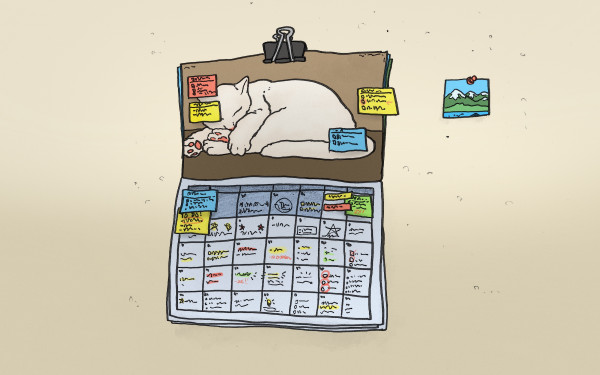Concordia Should Reboot Its E-Learning Strategy
“Real Education for the Real World” Doesn’t Happen Online
There’s been a lot of talk this year about online learning at Concordia.
Board of Governors and Senate meetings keep circling the subject, as we apparently need to move quickly to stay ahead of this online movement. What that means—or how it can be accomplished—is still muddied in bureaucratic waters.
University President Alan Shepard is a huge proponent of this push, which has become a substantial piece of his vision for Concordia.
That’s all well and good, but only so long as we understand what students actually want from their education here.
It’s one of the odd ironies of this generation that we no longer come to university exclusively to learn.
We’re here primarily for the degree and partly for the connections, social experience and—for some of us—the extra-curricular activities.
If our generation wants to learn something in particular, from the Python programming language to Spanish verb conjugation, we can already do it online, for free.
With tools like Codecademy and communities such as Google Course Builder, information sharing has never been easier.
Our eConcordia classes don’t come close to competing with the wide variety of resources available online, so it’s fundamentally strange to me that the university would even try to do so.
Why go head-to-head on a level playing field with everyone in the world when we can excel in areas they cannot?
The classroom allows for building programs that offer things students simply cannot get online. Building relationships with professors, staff and future co-workers will make all the difference when applying for jobs.
Plus, learning how to behave in a professional and challenging public environment is a really vital first step to entering the workforce.
And for some programs, there’s an added technical benefit.
A student representative and senior administrator recently suggested that because my program, computation arts, emphasizes digital work, it’s the perfect candidate for online learning.
That’s like suggesting that all publishing should happen in a library.
Much of our work, which ranges from electronics to animation, requires heavy-duty and expensive equipment. Concordia has excellent facilities for this, which contributes significantly to the program’s success.
Online, CART would be forced to focus on the theoretical rather than the practical. As a university whose motto until recently was “real education for the real world,” that would run contrary a supposedly central tenet of Concordia.
Not to mention it probably won’t help our attempts to bolster the university’s reputation.
As we attempt to build a name for our university that’s worth something, we don’t want to appear to be giving out degrees. Unfortunately, that’s exactly the image an online-centric university gives off to potential applicants and their parents.
Inside the school, we have another problem.
Several administrators have asked that the university’s governing bodies not focus too much on issues regarding eConcordia and its contractor, KnowledgeOne. To do so, they say, could mean losing sight of the wider potential of online learning at Concordia.
On the contrary, we seem to be moving beyond these concerns far too quickly.
It’s unclear if, as was previously the case, members of Concordia’s Board of Governors also sit on eConcordia’s Board.
And while one of online learning’s biggest benefits should be cutting costs, KnowledgeOne is a for-profit company that has yet to finish a year with a surplus.
“As we attempt to build a name for our university that’s worth something, we don’t want to appear to be giving out degrees. Unfortunately, that’s exactly the image an online-centric university gives off to potential applicants and their parents.”
It’s this inability to cover costs that might explain why its workers are getting treated so terribly.
The most recent presentation on e-learning boasted that “a substantial number of [teaching assistants] are being supported through their work in eConcordia.”
Those same TAs might disagree. After fighting to join the Teaching and Research Assistants at Concordia union, online TAs had their hours cut to ensure they wouldn’t get a pay bump. The excess work was dumped on professors, who received no compensation for it.
Clearly, this is not an organization helping combat the labour-relations nightmare currently raging at Concordia.
The March 15 Senate meeting promises to address specifics, including creating a roadmap for the future of e-learning at Concordia.
There, Concordia can consider how it can integrate physical and online learning into the same space. Very few classes are perfect for either medium, but every one could benefit from using both.
This seems to be the direction in which Shepard and the Provost are headed, but it would be nice to solidify that with some concrete decisions.
Let’s take advantage of the fact that Concordia has a team of critical and tech-savvy student senators.
Senate could strike a working group including these students mandated to look into different organizations and online tools Concordia could use.
Moodle and massive online courses are not our only options. With diligent research and careful analysis, we could start building e-learning into all our classes and leave online-only for occasional electives.
Digital textbooks, free tutorials and video lectures could supplement the in-class experience in a way we’re just not set up to do right now.
But our first step needs to be cleaning up our relationship with KnowledgeOne. Anything else will only set us up for more of the same in the future.

(WEB)_720_864_90.jpg)


(WEB)_600_375_90_s_c1.jpg)
_600_375_90_s_c1.jpg)

_600_375_90_s_c1.jpg)